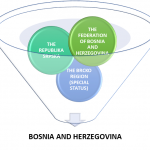Bosnia and Herzegovina declared its independence from the former Yugoslavia with a referendum in 1992. Afterwards, it witnessed a heavy war that lasted for about 4 years. The Bosnians had fought the Croats in the west and south of the country and the Serbs in the east and north. Serbian nationalists, defending the ideal of “Greater Serbia” and with the aim of ethnic cleansing, carried out great massacres in some cities. More than 2 million people left their homes during the war, and more than 300,000 people, most of whom were civilians, lost their lives. The war, which caused great destruction, massacres, genocide and crimes against humanity, ended with the Dayton Agreement.
DAYTON AGREEMENT
The Dayton Agreement is the peace agreement that ended the Croatian War and the Bosnian War of 1991-1995. This agreement was signed by President of the Republic of Bosnia and Herzegovina Aliya Izzetbegovic, President of the Federal Republic of Yugoslavia Slobodan Miloševićand President of Croatia Franjo Tuđman in Dayton, Ohio, USA in 1995. Following the signing of the agreement, NATO forces were sent to the regions in 1996.
According to the agreement, Bosnia and Herzegovina consisted of the Federation of Bosnia and Herzegovina, where the majority of the population is Croats and Bosniaks, and the Republika Srpska, which has a large Serb population, and the Brcko region with a special status. With this agreement, it was envisaged that 49% of the country would be controlled by the Republika Srpska and 51% by the Federation of Bosnia and Herzegovina.
From this perspective, it is possible to see that the Dayton Agreement has a very complex structure. Although the agreement also determined the constitution of Bosnia and Herzegovina, it tied an unresolved knot in the country. In addition, while bringing a complex political system to the country, it renders Bosnia and Herzegovina dysfunctional in many issues and negatively affects decision-making. While the Dayton Agreement was successful in ending the war, it introduced a complex system that could lead to greater crises.

WHAT IS HAPPENING TODAY?
When Milorad Dodik, the leader of the Republika Srpska of Bosnia and Herzegovina, and former UN High Representative Valentin Inzko boycotted the law that criminalized the denial of the genocide that took place in the 90s, after the political crisis broke out in Bosnia and Herzegovina, Dodik’s separatist rhetoric continued in July.
Last month, Dodikin also stated that if the Dayton Peace Agreement is not actually revoked, Republika Srpska, one of the two entities in the country, will declare its independence and that they will establish their own armies and institutions. Thereupon, the UN High Representative of Bosnia and Herzegovina, Christian Schmidt, published a report, emphasizing that the existence of Bosnia and Herzegovina was under threat, noting that the danger of civil war was possible. In his report to the UN, Schmidt also stated that more international peacekeepers would be needed to prevent a new war in the country if they divided the national armed forces into two and formed their own army, namely the Serbian force.
As a first step, Dodik ensured that the bill on transferring the powers of the nationally authorized Bosnia and Herzegovina Medicines and Medical Equipment Agency to a new institution to be established within the Republika Srpska was approved in the RS Assembly. While the existence of an institution to be established at the entity level was described as Republika Srpska preparing for a “parallel” state, Dodik went further and claimed that 7 European Union countries supported the independence of Republika Srpska. Peter Stano, one of the spokespersons of the EU Commission, emphasized that the stance of the 27 members of the EU on the claim that 7 EU countries supported the disintegration of Bosnia and Herzegovina is clear and clear, and stated that they support the sovereignty and territorial integrity of Bosnia and Herzegovina.
EUFOR, a 700-strong European Union force, operates within the framework of the international peacekeeping mission in Bosnia and Herzegovina. NATO also has a headquarters in Sarajevo. The one-year mandates of both were renewed at the UN Security Council. Even in the case of renewal of EUFOR, some countries such as Hungary allegedly supported Dodik. At the same time, Dodik stated that he had friends who promised to support him in case the West attempted a military intervention. It is estimated that the states that promised support are Serbia and Russia. Because Russia threatened to block the decision if the powers of the Bosnian High Representative were not revoked.
Although Dodik defines Bosnia and Herzegovina as a failed country, he thinks that the only way to resolve the conflict is the elimination of Bosnia and Herzegovina. At the same time, in such a situation, it is estimated that they want to assimilate the Muslims there by keeping Bosnia and Herzegovina away from the sea strip and leaving it small.
About Author:
Ayşe Selcan Akın is studying in the department of International Relations at Hacettepe University. She also attends the department of Local Government at Anadolu University. She is an intern at the Center for Middle Eastern Studies. She speaks advanced English, intermediate German and Korean. She is interested in the fields of Security Studies, Foreign Policy and International Law.










